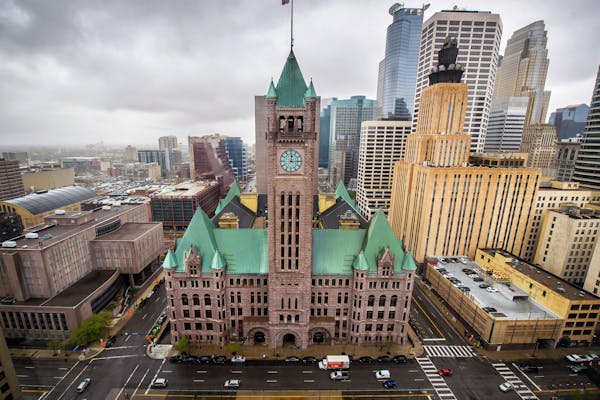Opinion editor's note: Star Tribune Opinion publishes a mix of national and local commentaries online and in print each day. To contribute, click here.
•••
In summer 2017 I wrote a commentary for these pages about the drift of Minneapolis politics toward more extreme positions on public safety, economic growth, business success and basic governance ("Leftward, whoa!" July 23, 2017). My hope was that voters would prevent the drift from becoming a lurch. Instead, what became the "defund police" City Council was elected.
Four years later Minneapolis voters had had enough and delivered a clear rebuke, sending several common-sense progressives to the City Council to replace extreme incumbents. Voters also turned back a "defund" inspired charter amendment and approved for the first time executive authority for the mayor to take responsibility for the delivery of municipal services.
As the 2023 election approaches, with all 13 council seats on the ballot, city voters face another decision point. Will results in November take us back to the leftward lurch of 2017?
From my point of view, Minneapolis voters should favor candidates who display these attributes:
Consider many perspectives: Conflicting facts and considerations often need to be weighed when coming to a decision on important policy questions. Office holders and candidates who listen only to those they agree with, filtering out dissenting opinions, might satisfy fervent supporters but do the general public a disservice. Those open to hearing opposing arguments, who avoid "confirmation bias" when reaching a position, are acting in the city's best interest.
Reinforce civility: Too often in recent years debate at City Hall and in other public forums has degenerated into embarrassing and sometimes menacing behavior. Officials and others seeking to participate in civic life have been threatened. The corrosive effect of social media has been granted an undeserved and outsized impact. Enough. Incumbents and challengers must be unambiguous in their rejection of this trend.
Understand that economic laws apply to Minneapolis: Try as some might, it's impossible for local officials to bend basic realities of the economy to their will. Not that an economy is unchanging. It evolves — but not in response to decisions made at Minneapolis City Hall. The revolution does not start here. Policymakers who focus on harnessing economic forces for progress in the city serve us all the best.
Understand the importance of business and investment: Private enterprises large and small throughout Minneapolis employ our residents, provide tax revenue for critical public services, fuel vitality and create opportunities for much needed housing growth. Beware of those in public life who reflexively denounce the private sector. The pathway they walk leads to stagnation.
City Hall plays an important role, with other levels of government, providing safety net services and supporting the health, job readiness and housing stability of Minneapolis residents. But I learned during my many years running Project for Pride in Living that investing in the self-sufficiency of people yields far superior results to well-intentioned efforts to regulate social and economic outcomes. A recent example is news that mandated higher wages in Minneapolis and St. Paul have modestly increased earnings for some at the cost of jobs for thousands more.
Committed to rebuilding the Minneapolis Police Department: No issue had been more divisive since the murder of George Floyd than the future of MPD. But with a reform-minded police chief and commissioner of public safety in place, with recent rule changes at the state police licensing board (POST Board), and with guidance from developing agreements with the Minnesota Department of Human Rights and the U.S. Department of Justice, it's time to go all in on rebuilding the department. This includes replacing the Third Precinct so fully one-quarter of our neighbors have better access to safety services.
These days, no one holding or running for public office will admit to being a "defunder." But voters must look deeper to discern which candidates will be truly committed to this essential work.
That includes seeing the value of integrating, not siloing, law enforcement and non-policing safety strategies. Community outreach, mental health services and violence prevention are essential approaches when delivered as part of a seamless continuum of responses along with law enforcement. Current council members and those aspiring to hold office who see the importance of integrating policing and non-policing strategies will serve us well.
Finally, as regards one subset of candidates, those endorsed by the Twin Cities Democratic Socialists of America (DSA), there is another essential consideration for voters. Given fringe DSA views on matters of great importance to all who live in Minneapolis (e.g. no additional resources for policing, perpetuating unsafe homeless encampments, creating property-tax-busting new city services), voters must ask which of these extreme positions will be disavowed by candidates and which would be bought to City Hall if they were elected?
Unless pressed by the electorate it will be easy for these candidates (Robin Wonsley, Second Ward; Soren Stevenson, Eighth Ward; Jason Chavez, Ninth Ward; Aisha Chughtai, 10th Ward; Aurin Chowdhury, 12th Ward) to avoid accounting for their decisions to seek and accept the DSA imprimatur. They should not be given a pass.
It has become trite to assert that every election is the most important one yet. That's not how I see this fall's contest. It is more like the next, can't-miss installment in an evolving story of Minneapolis politics.
The last two municipal election "episodes" provided different clues about the ultimate direction voters see as best for the city's future. This fall, which direction will be reinforced over the other? That's what voters will determine.
Steve Cramer is president and CEO, Minneapolis Downtown Council. He recently announced plans to retire at year's end.
Cut down on electronic waste in Minnesota
In Minnesota, statistical gloom amid the hope of a progressive-led boom


